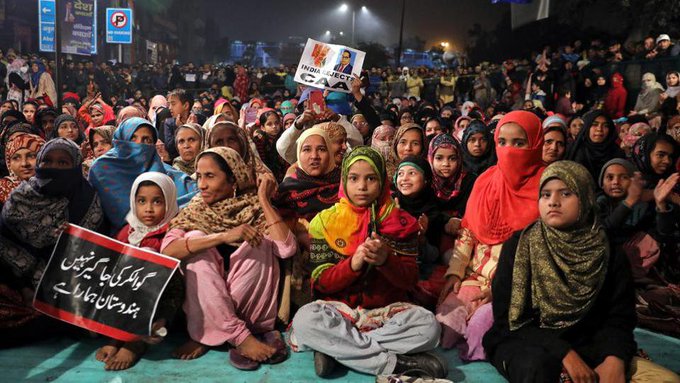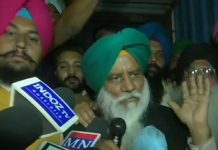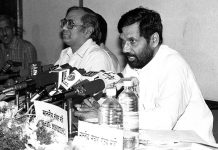
After almost four months of silence, Shaheen Bagh again became the centre of attention when supposedly 50 Shaheen Bagh activists and organisers led by a man named Shahzad Ali joined the Delhi BJP unit in the presence of the state BJP chief. Following this, the Aam Aadmi Party (AAP) sensed an excellent opportunity and held a press conference addressed by its Greater Kailash MLA Saurabh Bhardwaj and alleged that the Shaheen Bagh protests were orchestrated, scripted and plotted by the BJP. This found its expression on Twitter primarily through two hashtags; #BJPShaheenBaghExpose and #BJPShaheenBaghNexus. Both these hashtags aimed at delegitimising the BJP along with simultaneously delegitimising the Shaheen Bagh protests- largely led and sustained by Muslim women.
So why is AAP making such claims? Why is it running a sustained campaign to push this ‘Shaheen Bagh-BJP nexus’ narrative? What will it gain or what does it hope to gain by pushing the BJP centred conspiracy theory on Shaheen Bagh protests? The answer can only be found in how AAP has approached the question of CAA-NRC-NPR.
The position of the Aam Aadmi Party (AAP) on CAA-NRC-NPR as well as on Shaheen Bagh protests have been nothing but ambiguous with a tilt towards the political Right. It had virtually distanced itself from the protest as well as from the entire issue. But this is not the first time that AAP has claimed that Shaheen Bagh protest were a BJP backed conspiracy. Even though the party opposed the CAA in parliament, it did not cite the anti-Muslim nature of the amendments as the reason for its opposition but cleverly chose a regional identity to register its protest against the CAA. In December 2019, AAP leader Sanjay Singh alleged that the pan India NRC was a “conspiracy against the Purvanchalis”!
This ‘conspiracy’ centric approach was also extended while dealing with the Shaheen Bagh protests. In fact both the parties i.e. the BJP and the AAP from the very beginning have maintained and reiterated that Shaheen Bagh protests were a ‘conspiracy’, but for different reasons. While the BJP called it a conspiracy to malign the BJP government, divide the nation and consolidate the ‘minority vote bank’, the AAP accused the BJP of doing ‘dirty politics’ over it before the Delhi assembly elections. In both their accusations and counter-accusations, the agency of the protesters was totally ignored as well as erased.
Further, the AAP leaders tried to deflect the question of Shaheen Bagh as much as possible during election campaigns. During a live program on Times Now, Arvind Kejriwal, when asked whether he considered the legislations as anti-Muslim, replied: “I think CAA and NRC are irrelevant, I think what the people want is for the government to stop the CAA and stop the NRC and pay attention to governance”. Similarly in an interview to NDTV, Kejriwal said “If Delhi Police was under our jurisdiction, we would have opened the Shaheenbagh roads in 2 hours”. It is an irony that a party and a leader born out of a social movement which blocked roads and ‘disruptions’ castigated this mode of protest
Regarding the CAA another AAP leader Raghav Chadda went to the extent of saying,“This legislation is the Centre’s work, we have nothing to do with this at all”. He also said that his party had nothing to do with the Shaheen Bagh protests and its focus was on basic amenities. The AAP approached the entire issue of Shaheen Bagh protests through the lens of law & order and as a governance issue, completely side-tracking the anti-Muslim thrust of the amendment.
By pushing Shaheen Bagh-BJP conspiracy theory, the AAP hopes to achieve many things. First of all it hopes to seek absolution from the Muslim Community for not participating and standing with them. It also wants to justify ‘self-distancing’ from the popular protests as none of its leader visited the protest site, except for Amanatullah Khan who met a few students. Further, the AAP maintained a strange silence on the East Delhi riots which immediately followed their victory in Assembly elections. By pushing the Shaheen Bagh-BJP conspiracy, the AAP is also implying that the East Delhi Riots were an extension of that protests, and hence a BJP hatched ‘conspiracy’. By doing so, again, the AAP wants to absolve itself from the silence it maintained and also wants to wash away the “stains” caused due to the arrest of Tahir Hussain, an AAP councillor.
The other thing which AAP hopes to achieve is to delegitimize the BJP in eyes of the ‘Hindu’ population; particularly in Delhi. By implying that the entire protests was a conspiracy hatched by the BJP to reap electoral benefits, the AAP wants to establish its ‘politics of work’ over ‘politics of ideology’ and thereby consolidate its base which is very fluid given the drastic mismatch in percentage of votes which AAP got in 2019 Lok Sabha elections and 2020 assembly elections. It hopes to win over the ‘Hindu’ votes by saying that everything about the BJP is a conspiracy aimed to manipulate gullible masses in the name of Hindu-Muslim. Saurabh Bhardwaj in his press conference said: “I want to tell the BJP supporters of Delhi that the people against whom you protested, they were the people of Bharatiya Janata Party itself”.
The joining of the some 50 “Shaheen Bagh” activists in BJP also helps the AAP to counter all the allegations levelled against it during the election campaign. From being accused of supplying ‘biyrani’ to Shaheen Bagh to being anti-Hindu and anti-National to its chief being called a ‘terrorist’ ; the AAP sensed an excellent opportunity in those “Shaheen Bagh activists” to debunk all the allegations levelled against them during the Delhi Assembly elections campaign.
One of the time tested methods of delegitimizing and vilifying peoples’ movements by floating conspiracy theories that the movement was itself organized and sponsored by the very people and party against whom the movement was directed at. By pushing the ‘Shaheen Bagh-BJP nexus’ narrative, the AAP aims to delegitimize the BJP. But by doing so, it is also delegitimizing the Shaheen Bagh protest- which became an inspiration for similar such protests all across India- and thereby the entire anti-CAA movement. Though this might look like an excellent move from electoral point of view, the AAP has actually played in the hands of the BJP, though indirectly, as now it has become a part of delegitimization and vilification process directed at the anti-CAA movement.
Harshvardhan Tripathi is a Doctoral Researcher at JNU, New Delhi.













